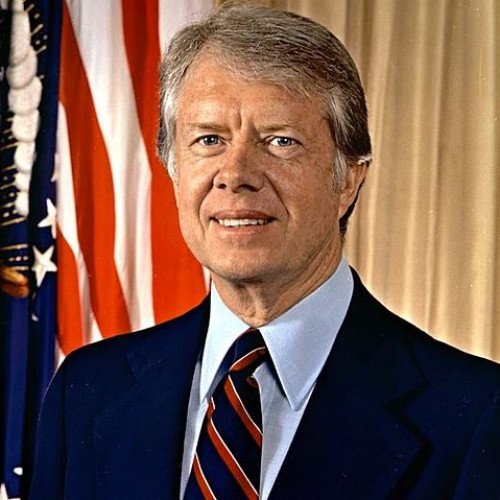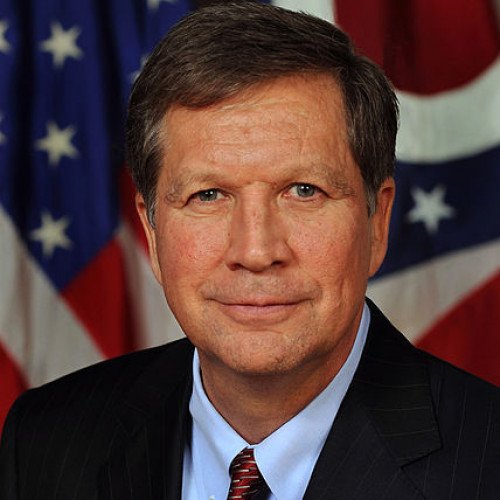Jimmy Carter VS John Kasich

Jimmy Carter
James Earl Carter Jr. (born October 1, 1924) is an American politician and philanthropist who served as the 39th president of the United States from 1977 to 1981. A member of the Democratic Party, he previously served as a Georgia State Senator from 1963 to 1967 and as the 76th governor of Georgia from 1971 to 1975. Since leaving the presidency, Carter has remained engaged in political and social projects as a private citizen. In 2002, he was awarded the Nobel Peace Prize for his work in co-founding the Carter Center. Raised in Plains, Georgia, Carter graduated from the United States Naval Academy in 1946 with a Bachelor of Science degree and joined the United States Navy, where he served on submarines. After the death of his father in 1953, Carter left his naval career and returned home to Georgia to take up the reins of his family's peanut-growing business. Carter inherited comparatively little due to his father's forgiveness of debts and the division of the estate among the children. Nevertheless, his ambition to expand and grow the Carters' peanut business was fulfilled. During this period, Carter was motivated to oppose the political climate of racial segregation and support the growing civil rights movement. He became an activist within the Democratic Party. From 1963 to 1967, Carter served in the Georgia State Senate, and in 1970, he was elected as Governor of Georgia, defeating former Governor Carl Sanders in the Democratic primary on an anti-segregation platform advocating affirmative action for ethnic minorities. Carter remained as governor until 1975. Despite being a dark-horse candidate who was little known outside of Georgia at the start of the campaign, Carter won the 1976 Democratic presidential nomination. In the general election, Carter ran as an outsider and narrowly defeated incumbent Republican President Gerald Ford. On his second day in office, Carter pardoned all the Vietnam War draft evaders by issuing Proclamation 4483. During Carter's term as president, two new cabinet-level departments, the Department of Energy and the Department of Education, were established. He established a national energy policy that included conservation, price control, and new technology. In foreign affairs, Carter pursued the Camp David Accords, the Panama Canal Treaties, the second round of Strategic Arms Limitation Talks (SALT II), and the return of the Panama Canal Zone to Panama. On the economic front, he confronted stagflation, a persistent combination of high inflation, high unemployment and slow growth. The end of his presidential tenure was marked by the 1979–1981 Iran hostage crisis, the 1979 energy crisis, the Three Mile Island nuclear accident, and the Soviet invasion of Afghanistan. In response to the invasion, Carter escalated the Cold War when he ended détente, imposed a grain embargo against the Soviets, enunciated the Carter Doctrine, and led a 1980 Summer Olympics boycott in Moscow. In 1980, Carter faced a challenge from Senator Ted Kennedy in the primaries, but he won re-nomination at the 1980 Democratic National Convention. Carter lost the general election to Republican nominee Ronald Reagan in an electoral landslide. He is the only president in American history to serve a full term of office and never appoint a justice to the Supreme Court. Polls of historians and political scientists usually rank Carter as a below-average president. Carter's activities since leaving the presidency have been viewed more favorably than his presidency itself. In 1982, Carter established the Carter Center to promote and expand human rights. He has traveled extensively to conduct peace negotiations, monitor elections, and advance disease prevention and eradication in developing nations. Carter is considered a key figure in the Habitat for Humanity charity. He has written over 30 books, ranging from political memoirs to poetry, while continuing to actively comment on ongoing American and global affairs such as the Israeli-Palestinian conflict.
Statistics for this Xoptio

John Kasich
John Richard Kasich Jr. ( KAY-sik; born May 13, 1952) is an American politician, author, and television news host who served in the U.S. House of Representatives from 1983 to 2001 and as the 69th Governor of Ohio from 2011 to 2019. A Republican, Kasich unsuccessfully sought his party's presidential nomination in 2000 and 2016.Kasich grew up in McKees Rocks, Pennsylvania, moving to Ohio to attend college. After a single term in the Ohio Senate, he served nine terms as a member of the United States House of Representatives from Ohio's 12th congressional district. His tenure in the House included 18 years on the House Armed Services Committee and six years as chairman of the House Budget Committee. Kasich was a key figure in the passage of both 1996 welfare reform legislation and the Balanced Budget Act of 1997. Kasich decided not to run for re-election in 2000 and ran for president instead. He withdrew from the race before the Republican primaries. After leaving Congress, Kasich hosted Heartland with John Kasich on Fox News from 2001 to 2007 and served as managing director of the Lehman Brothers office in Columbus, Ohio. He ran for governor of Ohio in 2010, defeating Democratic incumbent Ted Strickland. He was re-elected in 2014, defeating Democratic challenger Ed FitzGerald by 30 percentage points. Kasich was term-limited and could not seek a third gubernatorial term in 2018; he was succeeded by Mike DeWine. Kasich ran for president again in 2016, finishing in third place in the Republican primaries behind Donald Trump and Ted Cruz. He won the primary in his home state of Ohio and finished second in New Hampshire. Kasich declined to support Trump as the Republican presidential nominee and did not attend the 2016 Republican National Convention, which was held in Ohio. In 2019, following the end of his second term as governor, Kasich joined CNN as a contributor. Kasich is known as one of the most prominent critics of Trump within the Republican Party, and he endorsed Democratic presidential nominee Joe Biden for president in a speech at the 2020 Democratic National Convention.